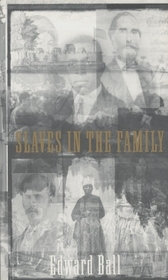Helpful Score: 5
The author, a descendant of one of the largest slave-owning families, confronts his past by researching archives and connecting with the descendants of the slaves. He tells a compelling story of black and white families,who lived side by side for five generations. The author attempts (and does an excellent job!) to explain why the slave legacy is still enmeshed in this country today. Reading this book gave me a greater understanding of our American history and human nature.
48 pages of historic and current photographs.
48 pages of historic and current photographs.
Helpful Score: 4
Writer Edward Ball opens Slaves in the Family with an anecdote: "My father had a little joke that made light of our legacy as a family that had once owned slaves. 'There are five things we don't talk about in the Ball family,' he would say. 'Religion, sex, death, money and the Negroes.'" Ball himself seemed happy enough to avoid these touchy issues until an invitation to a family reunion in South Carolina piqued his interest in his family's extensive plantation and slave-holding past. He realized that he had a very clear idea of who his white ancestors were--their names, who their children and children's children were, even portraits and photographs--but he had only a murky vision of the black people who supported their livelihood and were such an intimate part of their daily lives; he knew neither their names nor what happened to them and their descendents after they were freed following the Civil War. So he embarked on a journey to uncover the history of the Balls and the black families with whom their lives were inextricably intertwined, as well as the less tangible resonance of slavery in both sets of families. From plantation records, interviews with descendents of both the Balls and their slaves, and travels to Africa and the American South, Ball has constructed a story of the riches and squalor, violence and insurrection--the pride and shame--that make up the history and legacy of slavery in America.
Helpful Score: 3
This is a true account regarding slavery- powerful and painful for all! An account which forces us to look at our history- whether your ancestors were slaves or those who took slaves.
Helpful Score: 3
Thorough, thought-provoking and compelling story about appearance versus reality. Though I read it when it first came out I remember the honesty of the author. I kept wondering how those on both sides of the family would respond to the public knowing what happened. Would there be shame? Humiliation? Denial? Would the truth set them free? Would reconciliation come about for others beside the author? Of course, this is the pink elephant that no one wants to talk about in the south in particular.
I hope the author will one day choose to enlighten us where this journey took him in life.
I hope the author will one day choose to enlighten us where this journey took him in life.
Helpful Score: 2
This book is both a history of America and the Ball family as well as the people who were enslaved by them. It looks into early colonial America and into Africa. It is a rich text and also a voyage of discovery. The author is a descendent the Ball family, one of the oldest rice plantation owning "tribes" of the South. The book documents the author's family and the people who worked for them. Many of the ex-slave family members are now of much higher social and educational strata than the Ball family descendants. Others are the author's blood kin. It is a book to read slowly and examine. Very good.




